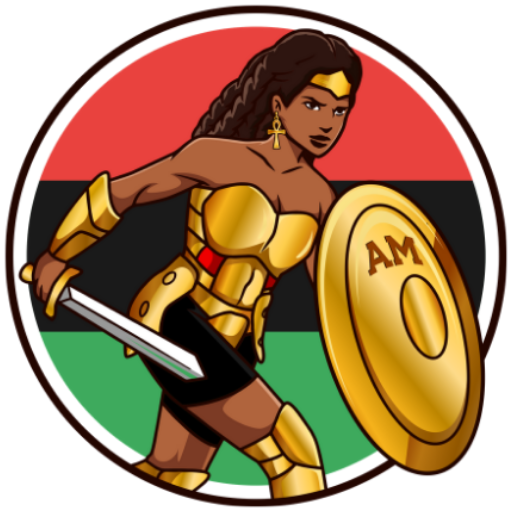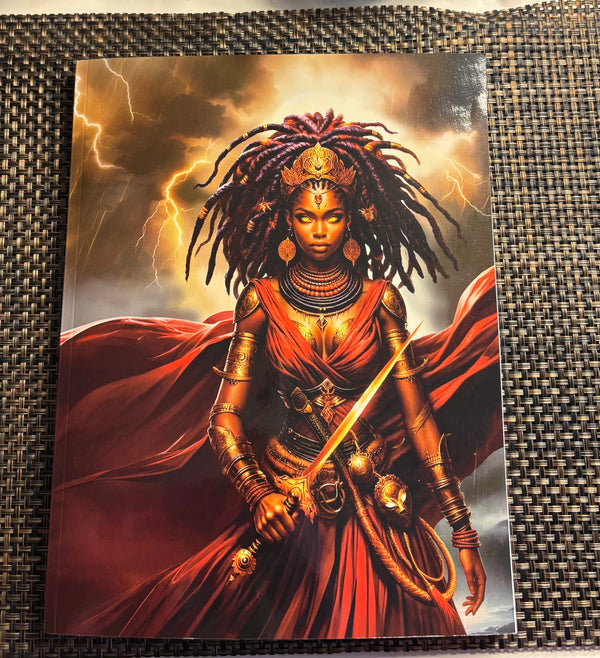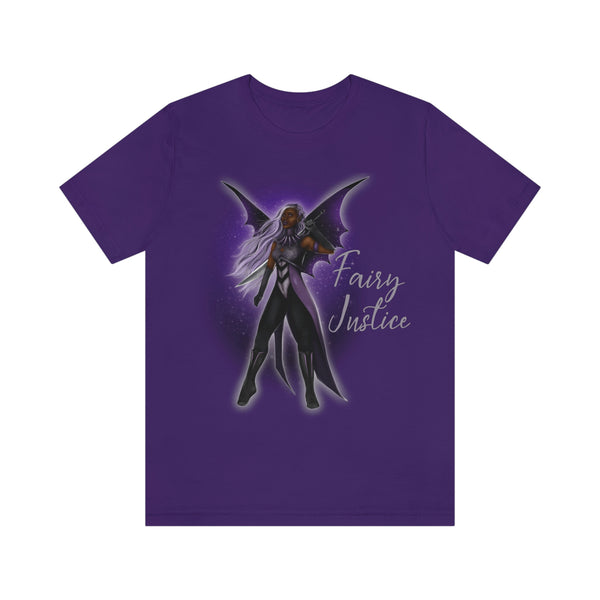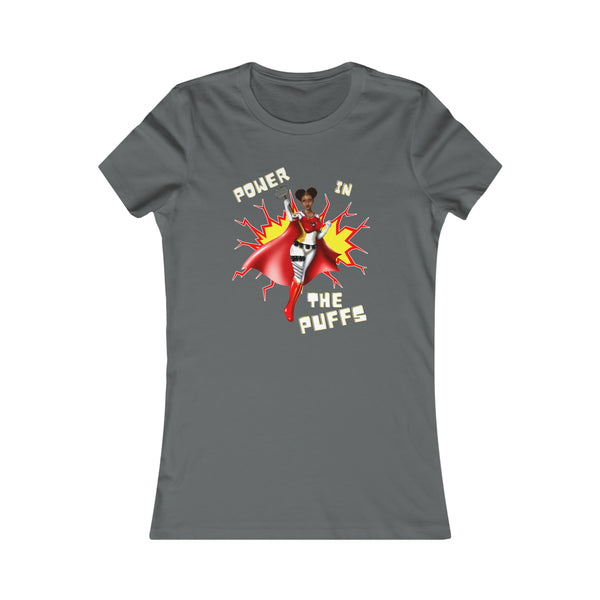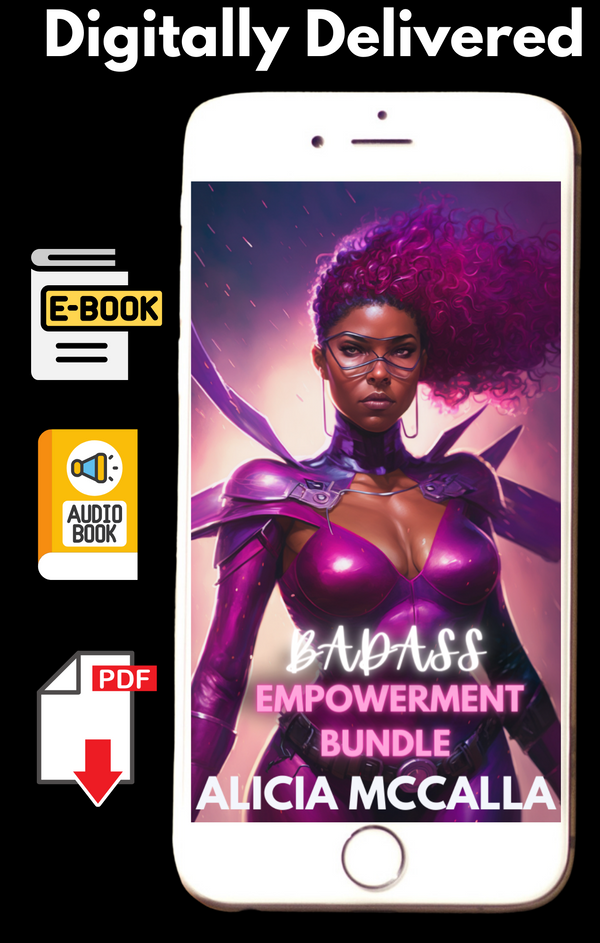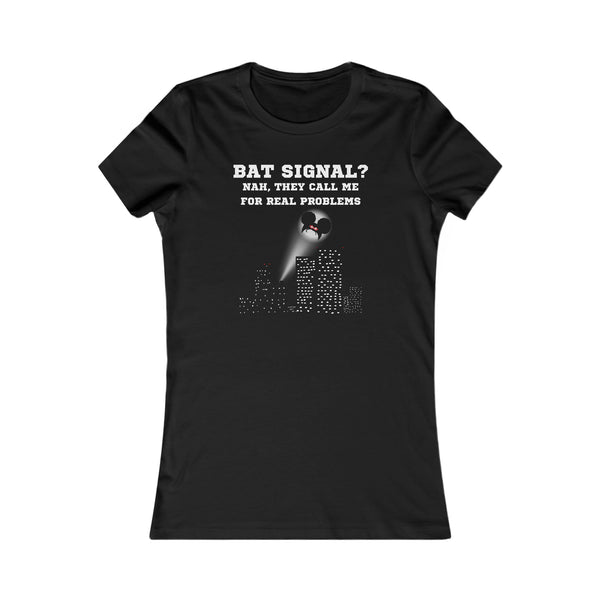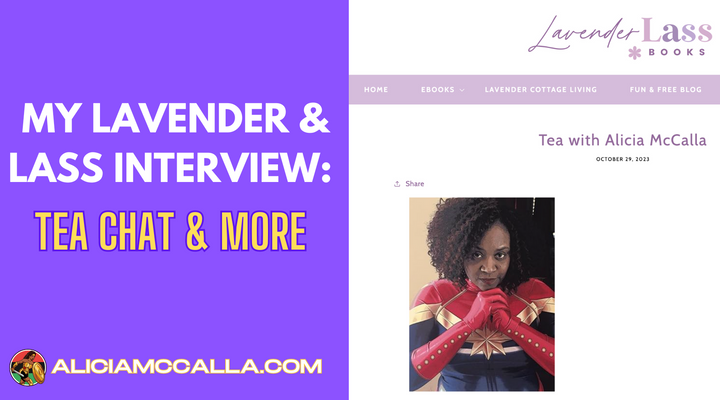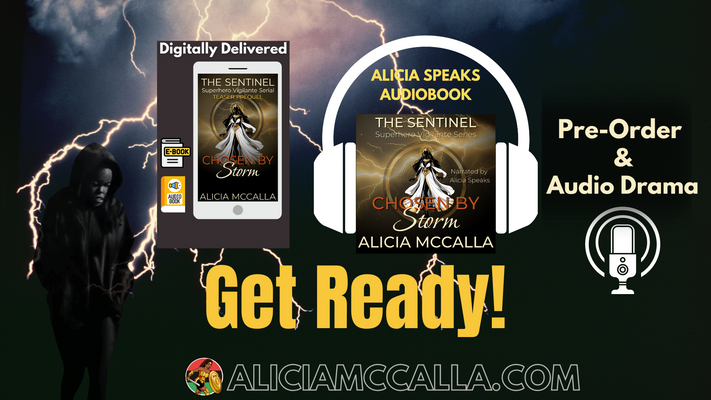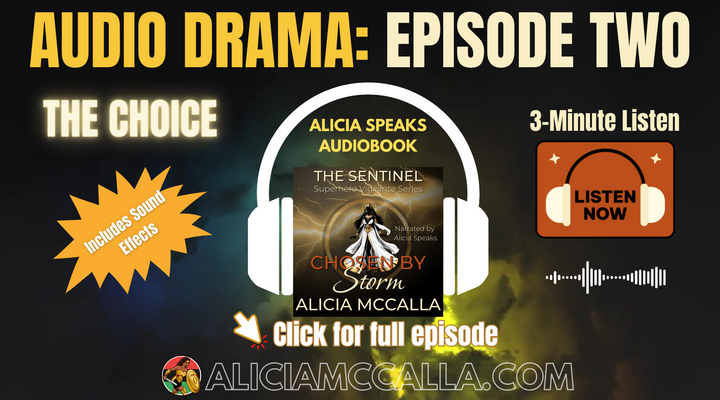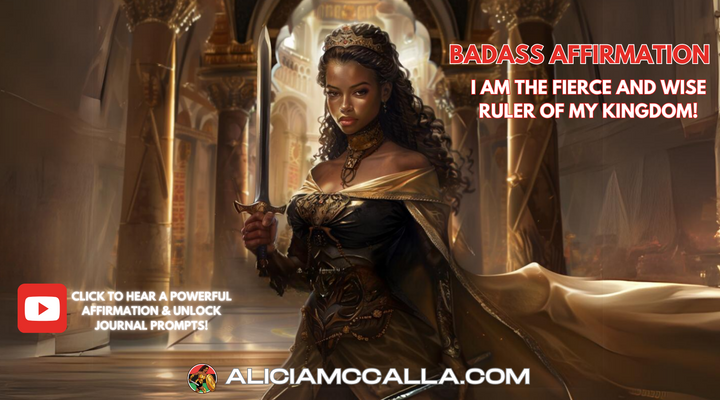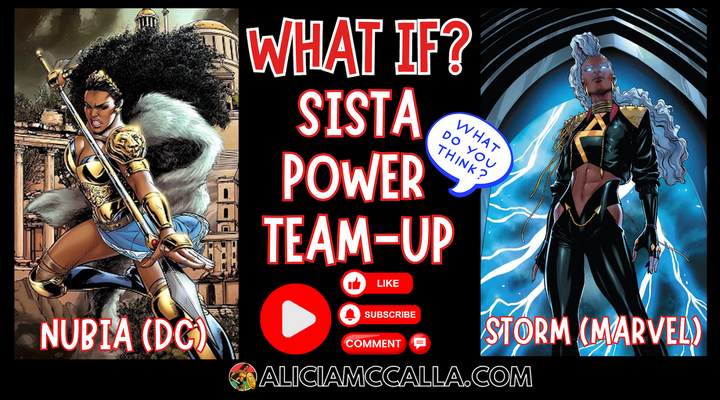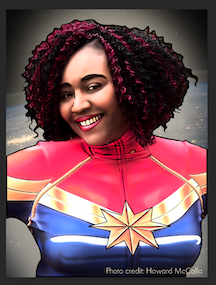
Interview Conducted By Grad Student at University of Texas at San Antonio
Share
I was very excited to learn of a course where students studied Black women’s speculative fiction. I would have enjoyed taking a course like that in Grad school. Several of my sister writers are being interviewed for this assignment (Kenya Wright and Crystal Connor are two that come to mind). After working with Elizabeth, I thought it’d be neat to bring Academia into the world of the writer. Here are Elizabeth’s very conscientious and thoughtful interview questions. I appreciated her hard work and thoroughness.
Interview Questions for Alicia McCalla
Elizabeth Stewart: Your published biographies and acknowledgements emphasis several key influences on your writing, including your roots as a Detroit native now living in Atlanta, your family bonds, and your current occupation as a librarian. I also saw a reference to graduate work in an entry on your website. What is your academic history and your study interests and how have they impacted your genre choices? What other biographical influences are important for your readers to know?
Alicia McCalla: I have always been a very curious person and as a child was placed in what would be termed today as “gifted” classes. I attended Cass Technical High School and the curriculum that I followed was “Science and Arts.” I believe that’s where my love of science fiction began to grow. However, my mom does have a story of mine from elementary school where I wrote about a little black girl traveling in space so maybe it goes back further. During my undergraduate years, I studied English, Film, and Women Studies. I also was the Editor-in-chief of the African-American student magazine. Since Oakland University was predominantly white, I endured racial hostility and it was here that I began to explore the intersection of race, class, and gender. After my experiences at OU, I was ready to attend a historically black college. At Clark Atlanta University, I began my studies in Africana Women’s studies with an emphasis in literature. I found, though, that the program didn’t fit my needs. I enjoyed literature from a more practical stand-point. I learned about the rich history of African-American librarians and changed my major to library service to follow in the footsteps of great librarians and archivist such as Virginia Lacy Jones. I have sincerely enjoyed my career as a librarian and have been in this profession for well over 16 years. I’ve worked K-24, meaning from elementary to university libraries. I currently work as a school librarian in a middle school.
So here’s my credentials:
B.A. in English with minor in film studies (Oakland University) 1993
M.S. in Library Service (Clark Atlanta University) 1998
Since I’m a “seat of the pants” type writer, it’s hard for me to say what influences my work. In the mornings, I just allow my subconscious to flow. I do believe that my graduate work in Africana women studies influences many of the themes but then I again, I try to conduct research on issues that attract me. As a reader, I’ve always enjoyed a good dystopian novel and urban fantasy so I believe there’s a natural connection in my subconscious between these types of stories and my natural interests.
I will say that growing up in Detroit has had an impact on my identity as an African-American. In the 70s and 80s, Detroit was well known for Pan Africanist thought as well as the uplifting of African Americans through the teachings of Marcus Garvey. I remember as a child singing songs such as “To Be Young Gifted and Black.” I also remember reading Angela Davis’ biography in middle school. These helped to define my identity and sense of self. I do believe that my worldview stems from that background and hence has a serious impact on my writing as a whole.
Elizabeth Stewart: You have self-identified your work as speculative fiction and compiled an anthology of black science fiction writers. What do you feel is the importance of speculative fiction? How does it influence and impact writers of color, especially black women?
Alicia McCalla: Science fiction, Speculative fiction, and Fantasy allows the imagination of the writer and reader to explore. When people of color are absent from this genre, that mindset then is eradicated from “futuristic” thinking. I enjoyed Orson Scott Card’s Ender’s Game immensely but the question is how many more times shall we explore the “young, white male’s identity within the terms of futuristic thought.” It’s the same with the Divergent and Hunger Games series in terms of the “white female’s futuristic thought.” It is time for a commercial speculative fiction work from a person of color to share that world view. This is why I write my stories. bell hooks says it best with “from margin to center.”
Elizabeth Stewart: In a letter to your readers published on your website about the upcoming Soul Eater book, you say your "paranormal stories border on being more literary than commercial" (Letter here). While early in the letter you seemed skeptical about the suggestion of your stories being taught in a college classroom, it is a very real possibility as speculative fiction gains the attention of the academy. Why would you say your work should be studied rather than simply consumed at a commercial level? How do you think your stories fit into the academy and how can they build on the work of former breakthrough writers like Octavia Butler and Toni Morrison?
Alicia McCalla: No, what I really lamented about in that letter was that some readers considered my work to be literary rather than commercial. I actually intended for my stories to be viewed as commercial. Several of the Beta readers for Iniko stated that they learned about West African mythology and history, which was great but in another blog post, I really wondered why African-Americans know the Greco-Roman gods and goddesses better. So, for me, I think that the underlying issue stems from West African mythology being on the fringe of education. It is simply not taught in the classroom. That’s hard. Readers then have to “study up on it” to understand those subtle nuances. It was my goal to write a work that explored urban fantasy using West African gods and goddesses similarly to series that use Greek or Roman gods and goddesses. I wanted it to have commercial appeal but I do believe that academia can find some interesting thought in my series. It is my hope, however, to encourage other writers to explore this pantheon and do something different than what I’ve been doing. My interpretations are obviously steeped in my viewpoint as a Westernized black woman.
I love Octavia Butler’s and Toni Morrison’s work. I’ve studied them greatly but more importantly, I have simply enjoyed reading their stories. These two women have trail blazed and open the door for writers like me to add to the world of speculative fiction. I can only pay homage to them for what they’ve given in laying the foundation for black women’s speculative fiction. I hope that one day, my work, can be a part of the larger discussion.
Elizabeth Stewart: You address larger social issues in your stories as underlying themes. In Breaking Free in particular some of the social issues I observed include class and race tensions, influence of the media on society, societal treatment of disabilities, and the limits (or lack thereof) of technology. What do you feel are the two most poignant themes and why are they important for your young adult audience?
Alicia McCalla: When I wrote Breaking Free, I was very interested in the destruction of Black families by outside forces. Though, I’m not sure any of the teenagers that have read my books would agree. When I’ve spoke to them, they often discuss the interracial relationship between XJ and Brandon as well as the crazy third wheel, Heather. Boys, in particular, enjoy the action in the stories and love the fight scenes. Young adults often don’t zero-in on the themes that we would like.
Elizabeth Stewart: "Flee" and Iniko from the African Elementals series also have strong social issues as underlying themes, including domestic violence, female genital mutilation, slavery, and rape, as well as more traditional themes and motifs, such as good versus evil and crossroad choices. What do you consider the most important themes and motifs in the series? How do you plan to leverage them in the remaining African Elementals stories?
Alicia McCalla: The African Elementals have a myriad of strong social themes. I think I dumped them all into this series. LOL! What fascinates me most about this series is the ability of the characters to grow, heal, and defeat the darkness. I would say that the “good vs. evil” theme is the strongest and carries throughout the entire series. Once The Soul Eater is complete, I would imagine that readers will have lots of discussion and questions about the turn of events. I definitely push boundaries and limits in this series.
Elizabeth Stewart: All three works I read are built on an alternating point of view structure, jumping from one perspective to another. Why did you decide to adopt this narrative structure for your works? How does it impact the stories' delivery? How would the stories change if they were third person from one perspective or simply first person?
Alicia McCalla: I thought long and hard about the POV and narrative structure in all of these works. I do know, though, that most urban fantasies are written in the first person POV of the main character and SciFi tends to be what I’ve chosen to do in my works. I took a chance with the Urban Fantasy, for sure, but I believe the strong societal ills and issues needed that third person lens. Honestly, because my themes are incredibly huge, I felt like third person with alternating POVs was the best choice. Then, readers could get a glimpse and feel for the world building. After I finish both series, my next project will be more personal. I’ve been thinking about a fairy detective or assassin from that first person POV. We shall see how that goes. The choice and selection of narrative structure and POV is not something to take lightly in speculative fiction. Each one sets up a certain perspective for the reader that can help them to understand what’s happening in your world.
Elizabeth Stewart is an MA student at the University of Texas at San Antonio. She is currently taking a Black Women Writers in Speculative Fiction course with Dr. Kinitra Brooks (View her university profile here: http://colfa.utsa.edu/english/brooks.html). The assignment was to study an author in the field, read two of her works and construct interview questions.
